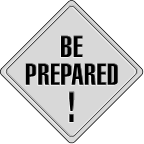PROTECTION WITHOUT OVERPROTECTION
A DELICATE BALANCE
 Today’s children require more protection by parents than ever before. Stranger dangers and family abuse are on the rise. Television and the Internet invade our households and expose children to explicit language, violence, and sex that children of previous generations were never exposed to. There is more aggression on
Today’s children require more protection by parents than ever before. Stranger dangers and family abuse are on the rise. Television and the Internet invade our households and expose children to explicit language, violence, and sex that children of previous generations were never exposed to. There is more aggression on  playgrounds and in schools than parents ever experienced in their own childhoods. Parents need to prepare their children for this ever changing environment and protect them from very real dangers. Yet too much preparation and overprotection can also cause problems.
playgrounds and in schools than parents ever experienced in their own childhoods. Parents need to prepare their children for this ever changing environment and protect them from very real dangers. Yet too much preparation and overprotection can also cause problems.
SYMPTOMS OF OVERPROTECTION
Early symptoms of overprotected children don't often alert parents to the possibility that they may be overprotecting their children. Overprotected children tend to be sensitive and kind, often a reflection of their parents’ sensitivity and kindness. They are rarely troublemakers. If overprotection  continues, however, other less positive characteristics tend to emerge. Sensitive children may become oversensitive. Their feelings are too easily hurt. Typical peer teasing reduces them to tears. They easily become peer victims. Their kindness becomes dependence on stronger children and a willingness to comply blindly with domineering friends they fear losing. They tend not to take initiative and give up easily when challenged rather than persevering. They may become anxious or have little confidence in themselves. As adolescents, they tend to vacillate between dependence and rebellion. They want to overthrow their parents’ protection but are fearful of independence.
continues, however, other less positive characteristics tend to emerge. Sensitive children may become oversensitive. Their feelings are too easily hurt. Typical peer teasing reduces them to tears. They easily become peer victims. Their kindness becomes dependence on stronger children and a willingness to comply blindly with domineering friends they fear losing. They tend not to take initiative and give up easily when challenged rather than persevering. They may become anxious or have little confidence in themselves. As adolescents, they tend to vacillate between dependence and rebellion. They want to overthrow their parents’ protection but are fearful of independence.
CHILDREN WHO ARE MORE LIKELY
TO BE OVERPROTECTED
Certain birth orders and circumstances may encourage more overprotection. For example, youngest children in the family may be more protected not only by parents but also by older siblings. Children who tend to be temperamentally more fearful may engage parents in protecting them too much. Parents may also be more likely to protect children with early illnesses or handicaps. Grandparents who are raising children in a substitute role of parents sometimes are more protective than they were with their own children.
RECOMMENDATIONS FOR
AVOIDING OVERPROTECTION
Determining when to encourage independence and when to protect children is not an easy task for parents of our times. Here are some guidelines that can help children to become cautious but independent.
-
Increase freedom with maturity. From preschool through adolescence, set
 continuously broadened limits so children's freedom is gradually increased as they show maturity and responsibility. There are no specific age guidelines, but after you teach a skill and practice it with your children, observe their responsible actions. When they seem ready to make the next step, permit them to make it independently.
continuously broadened limits so children's freedom is gradually increased as they show maturity and responsibility. There are no specific age guidelines, but after you teach a skill and practice it with your children, observe their responsible actions. When they seem ready to make the next step, permit them to make it independently. - Teach problem solving. Believe in your children’s ability to solve problems and praise good thinking. Practice problem solving; for example, ask children “What can you do if you think you are endangered by a ‘big kid’?” “Who can you trust to ask for help?” “When would you need to call 911?” Children can learn about stranger dangers, good and bad touching and what to do in an emergency in their preschool years.
-
Expose children to communication tools. Teach them to use the telephone, cell phone, two-way radios, or intercoms to keep in touch, carry change to make telephone calls, etc. Learning to communicate
 will help them feel safe and prevent your over-protection. They should call when they get to a friend’s home or when they leave a friend to come home. They should give you addresses and phone numbers of the children they visit.
will help them feel safe and prevent your over-protection. They should call when they get to a friend’s home or when they leave a friend to come home. They should give you addresses and phone numbers of the children they visit.
- Encourage your children’s openness. Help children understand that if they're uncertain about danger, they should report their concerns to you, so you can help them determine the danger. Safe communication about fears can help them to become brave and strong.
- Communicate with your children’s friends’ parents. Stay in touch with your children’s friends’ parents so your children know that you care and that you're not the only parents who do. The world is safe for your children if parents cooperate with each other.
-
Help young children trust other reliable people. Expose your children to other care givers you can trust. Don't assume you are the only safe sitter. When children learn who they can trust, they can become more confident.
- Permit your children to have adventures. Don't deprive them of opportunities when reasonable precautions have been taken and adult safeguards are in place. Adventures encourage a spirit of initiative, motivation, independence, and resilience that will help your children to eventually become stronger adults.
- Interpret children’s environments. Help children to put violent news into perspective. A murder or kidnapping does not necessarily mean they are in danger. Help them to feel secure in safe places and cautious when they may be in real danger.
- Help children to become emotionally resilient. Don't rescue your children from reality by making excuses for them. Don't intervene with appropriate school consequences or punishments. Emotional overprotection will teach them to look for an easy way out and will prevent them from becoming resilient.


©2010 by Sylvia B. Rimm. All rights reserved. This publication, or parts thereof, may not be reproduced in any form without written permission of the author.
